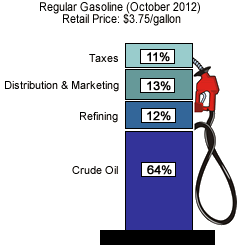What Makes Up The Price Of Gas
According to the U.S. Energy Information Administration (EIA) crude oil is by far the largest factor in the price of a gallon of gasoline – accounting for 64% percent of the $3.746 average retail price per gallon. Three other components are: refining costs, marketing and distribution and taxes.
The EIA says the retail price of gasoline is primarily based on the price paid for crude oil which is determined by the global trading of the commodity. Crude oil is one of a number of globally traded commodities like gold, corn, coffee and many others. The percentage of cost of a gallon of gas that is the crude oil price was up to a high of 71% in December of 2010. The percentage has fallen to 64% in the most recently released reports for October 2012. The crude oil cost as a percentage of the total price of gasoline historically ranged from 30% to below 50% from 2000 until July 2004 when it increased to 51%. In December 2011 crude oil accounted for 80% of the cost of a gallon of gas and it has steadily declined to the 64% that it is now.
Refining costs attributed 12% of the cost of a gallon of gas in October 2012. The percentage of refining costs and profits are the difference between the monthly average cost of gas verses the average price of crude oil purchased by refiners. The percentage has been lower than one percent, last year in November and December refining was recorded as costing -0.5 and -0.1 because the value of the petroleum coming out of the refinery wasn’t enough to cover the costs of obtaining and refining the crude oil. The percentage has been as high as 30% but only twice in the past 12 years.
Distribution and marketing costs are 12.8%, calculated as the difference between the average retail price of gasoline (as computed from EIA’s weekly survey) and the sum of the other 3 components: crude oil, refining and taxes.
The average percentage of taxes for a gallon of gas is 11.1%. From 2000-2002 taxes often accounted for 25% or more of the price. The number fell by 5% in 2007 with a low of 9% in 2008.The United States federal excise tax on gasoline is 18.4 cents per gallon (cpg) and 24.4 cents per gallon (cpg) for diesel fuel.
California’s gas tax averages $0.36 per gallon gasoline and $0.10 for diesel with .02 cents per gallon in “Other Taxes” include a cent per gallon state UST fee, a 2.25% state sales tax for gasoline, a 9.42% state sales tax for diesel, gasoline and diesel rates plus local sales taxes.
According to the EIA California’s total gasoline retail sales by refiners reached its peak in 2002 at 8,712.3 thousand gallons per day and dropped in 2011 to below 1994 use levels at 5,406.4 thousand gallons per day.
Ethanol has played a factor in prices as well. Nearly all fuel ethanol currently used in the United States is consumed as a blend with gasoline in volumes containing up to 10% ethanol (E10), which until late 2010 was the legal limit. For the first time in February 2010, the United States produced more ethanol than it used and has become a net exporter of fuel ethanol.
The short term EIA energy outlook put the price of gasoline at $3.64 per gallon in 2012 and $3.44 in 2013 which is lower than 2011 ($3.53) but not as low as in 2010 ($2.78).
To view and report local gas prices visit the gas prices page in the Traffic section.
A EIA Interactive data chart for national gas prices going back to 1977 can be viewed at http://www.eia.gov/forecasts/steo/realprices/.



